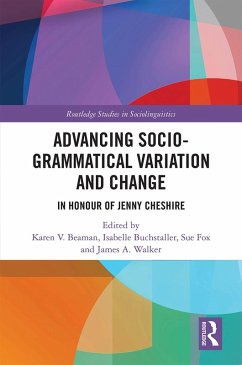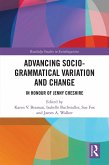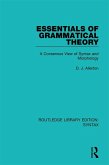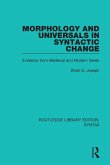Advancing Socio-grammatical Variation and Change (eBook, ePUB)
In Honour of Jenny Cheshire
Redaktion: Beaman, Karen V.; Walker, James A.; Fox, Susan; Buchstaller, Isabelle
42,95 €
42,95 €
inkl. MwSt.
Sofort per Download lieferbar

21 °P sammeln
42,95 €
Als Download kaufen

42,95 €
inkl. MwSt.
Sofort per Download lieferbar

21 °P sammeln
Jetzt verschenken
Alle Infos zum eBook verschenken
42,95 €
inkl. MwSt.
Sofort per Download lieferbar
Alle Infos zum eBook verschenken

21 °P sammeln
Advancing Socio-grammatical Variation and Change (eBook, ePUB)
In Honour of Jenny Cheshire
Redaktion: Beaman, Karen V.; Walker, James A.; Fox, Susan; Buchstaller, Isabelle
- Format: ePub
- Merkliste
- Auf die Merkliste
- Bewerten Bewerten
- Teilen
- Produkt teilen
- Produkterinnerung
- Produkterinnerung

Bitte loggen Sie sich zunächst in Ihr Kundenkonto ein oder registrieren Sie sich bei
bücher.de, um das eBook-Abo tolino select nutzen zu können.
Hier können Sie sich einloggen
Hier können Sie sich einloggen
Sie sind bereits eingeloggt. Klicken Sie auf 2. tolino select Abo, um fortzufahren.

Bitte loggen Sie sich zunächst in Ihr Kundenkonto ein oder registrieren Sie sich bei bücher.de, um das eBook-Abo tolino select nutzen zu können.
This groundbreaking collection showcases Jenny Cheshire's influential work in bringing greater attention to quantitative analysis of socio-grammatical variation and builds upon her contributions with new lines of inquiry pushing sociolinguistic research forward.
- Geräte: eReader
- ohne Kopierschutz
- eBook Hilfe
- Größe: 8.2MB
Andere Kunden interessierten sich auch für
![Advancing Socio-grammatical Variation and Change (eBook, PDF) Advancing Socio-grammatical Variation and Change (eBook, PDF)]() Advancing Socio-grammatical Variation and Change (eBook, PDF)42,95 €
Advancing Socio-grammatical Variation and Change (eBook, PDF)42,95 €![Teaching and Language Corpora (eBook, ePUB) Teaching and Language Corpora (eBook, ePUB)]() Anne WichmannTeaching and Language Corpora (eBook, ePUB)81,95 €
Anne WichmannTeaching and Language Corpora (eBook, ePUB)81,95 €![Clear English Pronunciation (eBook, ePUB) Clear English Pronunciation (eBook, ePUB)]() Dick SmakmanClear English Pronunciation (eBook, ePUB)37,95 €
Dick SmakmanClear English Pronunciation (eBook, ePUB)37,95 €![Essentials of Grammatical Theory (eBook, ePUB) Essentials of Grammatical Theory (eBook, ePUB)]() D. J. AllertonEssentials of Grammatical Theory (eBook, ePUB)40,95 €
D. J. AllertonEssentials of Grammatical Theory (eBook, ePUB)40,95 €![Morphology and Universals in Syntactic Change (eBook, ePUB) Morphology and Universals in Syntactic Change (eBook, ePUB)]() Brian D. JosephMorphology and Universals in Syntactic Change (eBook, ePUB)40,95 €
Brian D. JosephMorphology and Universals in Syntactic Change (eBook, ePUB)40,95 €![Routledge Revivals: Crabb's English Synonyms (1916) (eBook, ePUB) Routledge Revivals: Crabb's English Synonyms (1916) (eBook, ePUB)]() George CrabbRoutledge Revivals: Crabb's English Synonyms (1916) (eBook, ePUB)60,95 €
George CrabbRoutledge Revivals: Crabb's English Synonyms (1916) (eBook, ePUB)60,95 €![Generative Grammar (eBook, ePUB) Generative Grammar (eBook, ePUB)]() Robert FreidinGenerative Grammar (eBook, ePUB)48,95 €
Robert FreidinGenerative Grammar (eBook, ePUB)48,95 €-
-
-
This groundbreaking collection showcases Jenny Cheshire's influential work in bringing greater attention to quantitative analysis of socio-grammatical variation and builds upon her contributions with new lines of inquiry pushing sociolinguistic research forward.
Dieser Download kann aus rechtlichen Gründen nur mit Rechnungsadresse in A, B, BG, CY, CZ, D, DK, EW, E, FIN, F, GR, HR, H, IRL, I, LT, L, LR, M, NL, PL, P, R, S, SLO, SK ausgeliefert werden.
Produktdetails
- Produktdetails
- Verlag: Taylor & Francis eBooks
- Seitenzahl: 446
- Erscheinungstermin: 26. August 2020
- Englisch
- ISBN-13: 9781000092707
- Artikelnr.: 59937048
- Verlag: Taylor & Francis eBooks
- Seitenzahl: 446
- Erscheinungstermin: 26. August 2020
- Englisch
- ISBN-13: 9781000092707
- Artikelnr.: 59937048
- Herstellerkennzeichnung Die Herstellerinformationen sind derzeit nicht verfügbar.
Karen V. Beaman is a postdoctoral researcher at Eberhard Karls Universität Tübingen, Germany. Isabelle Buchstaller is professor at the University of Duisburg-Essen, Germany. Sue Fox is senior lecturer at the University of Bern, Switzerland. James A. Walker is professor at La Trobe University in Melbourne.
Foreword
Peter Trudgill
Introduction
Socio-grammatical variation and change: Theoretical and methodological
implications
Karen V. Beaman, Isabelle Buchstaller, Sue Fox, and James A. Walker
Section 1: CONCEPTUALISING SOCIAL MEANING
Chapter 1.1
Historical and ideological dimensions of grammatical variation and change
Lesley Milroy
Chapter 1.2
Towards an integrated model of perception: Linguistic architecture and the
dynamics of sociolinguistic cognition
Erez Levon, Isabelle Buchstaller and Adam Mearns
Chapter 1.3
Migration, class, and prestige in grammatical change in London
Devyani Sharma
Chapter 1.4
The role of syntax in the study of sociolinguistic meaning: Evidence from
an analysis of right dislocation
Emma Moore
Section 2: Combining the Social AND THE GRAMMATICAL
Chapter 2.1
What happened to those relatives from East Anglia?: a multilocality
analysis of dialect levelling in the relative marker system
David Britain
Chapter 2.2
Relativiser selection in a super-diverse city
Miriam Meyerhoff, Alexandra Birchfield, Elaine Ballard, Catherine Watson
and Helen Charters
Chapter 2.3
Swabian relatives: variation in the use of the wo-relativiser
Karen V. Beaman
Chapter 2.4
Modeling Socio-Grammatical Variation: Plural Existentials in Toronto
English
James A. Walker
Section 3: Formal Approaches to Syntactic Variation
Chapter 3.1
A sociogrammatical analysis of linguistic gaps and transitional forms
Sjef Barbiers
Chapter 3.2
Variation and Change in the Particle Verb Alternation Across English
Dialects
Bill Haddican, Daniel Johnson, Joel Wallenberg and Anders Holmberg
Chapter 3.3
Explaining Variability in Negative Concord: A Socio-syntactic Analysis
David Adger and Jennifer Smith
Section 4: LANGUAGE CONTACT AND Multi-eTHNOLECTS
Chapter 4.1
Tracing the origins of an urban youth vernacular: founder effects,
frequency and culture in the emergence of Multicultural London English
Paul Kerswill and Eivind Torgersen
Chapter 4.2
Syntactic variation in prepositional phrases of Cité-Duits, a miners'
multi-ethnolect (and other varieties of Dutch and German)
Peter Auer and Leonie Cornips
Chapter 4.3
When Contact Does Not Matter: The Robust Nature of Vernacular Universals
Daniel Schreier
Chapter 4.4
From Killycomain to Melbourne: Historical Contact and the Feature Pool
Karen P. Corrigan
Section 5: Discourse and Pragmatic Variation
Chapter 5.1
That beyond convention: The interface of syntax, social structure and
discourse
Sali A. Tagliamonte and Alexandra D'Arcy
Chapter 5.2
Sociolinguistic variation in the marking of new information: The case of
indefinite this
Stephen Levey, Carmen Klein and Yasmine Abou Taha
Chapter 5.3
Tagging monologic narratives of personal experience: utterance-final tags
and the construction of adolescent masculinity
Heike Pichler
Peter Trudgill
Introduction
Socio-grammatical variation and change: Theoretical and methodological
implications
Karen V. Beaman, Isabelle Buchstaller, Sue Fox, and James A. Walker
Section 1: CONCEPTUALISING SOCIAL MEANING
Chapter 1.1
Historical and ideological dimensions of grammatical variation and change
Lesley Milroy
Chapter 1.2
Towards an integrated model of perception: Linguistic architecture and the
dynamics of sociolinguistic cognition
Erez Levon, Isabelle Buchstaller and Adam Mearns
Chapter 1.3
Migration, class, and prestige in grammatical change in London
Devyani Sharma
Chapter 1.4
The role of syntax in the study of sociolinguistic meaning: Evidence from
an analysis of right dislocation
Emma Moore
Section 2: Combining the Social AND THE GRAMMATICAL
Chapter 2.1
What happened to those relatives from East Anglia?: a multilocality
analysis of dialect levelling in the relative marker system
David Britain
Chapter 2.2
Relativiser selection in a super-diverse city
Miriam Meyerhoff, Alexandra Birchfield, Elaine Ballard, Catherine Watson
and Helen Charters
Chapter 2.3
Swabian relatives: variation in the use of the wo-relativiser
Karen V. Beaman
Chapter 2.4
Modeling Socio-Grammatical Variation: Plural Existentials in Toronto
English
James A. Walker
Section 3: Formal Approaches to Syntactic Variation
Chapter 3.1
A sociogrammatical analysis of linguistic gaps and transitional forms
Sjef Barbiers
Chapter 3.2
Variation and Change in the Particle Verb Alternation Across English
Dialects
Bill Haddican, Daniel Johnson, Joel Wallenberg and Anders Holmberg
Chapter 3.3
Explaining Variability in Negative Concord: A Socio-syntactic Analysis
David Adger and Jennifer Smith
Section 4: LANGUAGE CONTACT AND Multi-eTHNOLECTS
Chapter 4.1
Tracing the origins of an urban youth vernacular: founder effects,
frequency and culture in the emergence of Multicultural London English
Paul Kerswill and Eivind Torgersen
Chapter 4.2
Syntactic variation in prepositional phrases of Cité-Duits, a miners'
multi-ethnolect (and other varieties of Dutch and German)
Peter Auer and Leonie Cornips
Chapter 4.3
When Contact Does Not Matter: The Robust Nature of Vernacular Universals
Daniel Schreier
Chapter 4.4
From Killycomain to Melbourne: Historical Contact and the Feature Pool
Karen P. Corrigan
Section 5: Discourse and Pragmatic Variation
Chapter 5.1
That beyond convention: The interface of syntax, social structure and
discourse
Sali A. Tagliamonte and Alexandra D'Arcy
Chapter 5.2
Sociolinguistic variation in the marking of new information: The case of
indefinite this
Stephen Levey, Carmen Klein and Yasmine Abou Taha
Chapter 5.3
Tagging monologic narratives of personal experience: utterance-final tags
and the construction of adolescent masculinity
Heike Pichler
Foreword
Peter Trudgill
Introduction
Socio-grammatical variation and change: Theoretical and methodological
implications
Karen V. Beaman, Isabelle Buchstaller, Sue Fox, and James A. Walker
Section 1: CONCEPTUALISING SOCIAL MEANING
Chapter 1.1
Historical and ideological dimensions of grammatical variation and change
Lesley Milroy
Chapter 1.2
Towards an integrated model of perception: Linguistic architecture and the
dynamics of sociolinguistic cognition
Erez Levon, Isabelle Buchstaller and Adam Mearns
Chapter 1.3
Migration, class, and prestige in grammatical change in London
Devyani Sharma
Chapter 1.4
The role of syntax in the study of sociolinguistic meaning: Evidence from
an analysis of right dislocation
Emma Moore
Section 2: Combining the Social AND THE GRAMMATICAL
Chapter 2.1
What happened to those relatives from East Anglia?: a multilocality
analysis of dialect levelling in the relative marker system
David Britain
Chapter 2.2
Relativiser selection in a super-diverse city
Miriam Meyerhoff, Alexandra Birchfield, Elaine Ballard, Catherine Watson
and Helen Charters
Chapter 2.3
Swabian relatives: variation in the use of the wo-relativiser
Karen V. Beaman
Chapter 2.4
Modeling Socio-Grammatical Variation: Plural Existentials in Toronto
English
James A. Walker
Section 3: Formal Approaches to Syntactic Variation
Chapter 3.1
A sociogrammatical analysis of linguistic gaps and transitional forms
Sjef Barbiers
Chapter 3.2
Variation and Change in the Particle Verb Alternation Across English
Dialects
Bill Haddican, Daniel Johnson, Joel Wallenberg and Anders Holmberg
Chapter 3.3
Explaining Variability in Negative Concord: A Socio-syntactic Analysis
David Adger and Jennifer Smith
Section 4: LANGUAGE CONTACT AND Multi-eTHNOLECTS
Chapter 4.1
Tracing the origins of an urban youth vernacular: founder effects,
frequency and culture in the emergence of Multicultural London English
Paul Kerswill and Eivind Torgersen
Chapter 4.2
Syntactic variation in prepositional phrases of Cité-Duits, a miners'
multi-ethnolect (and other varieties of Dutch and German)
Peter Auer and Leonie Cornips
Chapter 4.3
When Contact Does Not Matter: The Robust Nature of Vernacular Universals
Daniel Schreier
Chapter 4.4
From Killycomain to Melbourne: Historical Contact and the Feature Pool
Karen P. Corrigan
Section 5: Discourse and Pragmatic Variation
Chapter 5.1
That beyond convention: The interface of syntax, social structure and
discourse
Sali A. Tagliamonte and Alexandra D'Arcy
Chapter 5.2
Sociolinguistic variation in the marking of new information: The case of
indefinite this
Stephen Levey, Carmen Klein and Yasmine Abou Taha
Chapter 5.3
Tagging monologic narratives of personal experience: utterance-final tags
and the construction of adolescent masculinity
Heike Pichler
Peter Trudgill
Introduction
Socio-grammatical variation and change: Theoretical and methodological
implications
Karen V. Beaman, Isabelle Buchstaller, Sue Fox, and James A. Walker
Section 1: CONCEPTUALISING SOCIAL MEANING
Chapter 1.1
Historical and ideological dimensions of grammatical variation and change
Lesley Milroy
Chapter 1.2
Towards an integrated model of perception: Linguistic architecture and the
dynamics of sociolinguistic cognition
Erez Levon, Isabelle Buchstaller and Adam Mearns
Chapter 1.3
Migration, class, and prestige in grammatical change in London
Devyani Sharma
Chapter 1.4
The role of syntax in the study of sociolinguistic meaning: Evidence from
an analysis of right dislocation
Emma Moore
Section 2: Combining the Social AND THE GRAMMATICAL
Chapter 2.1
What happened to those relatives from East Anglia?: a multilocality
analysis of dialect levelling in the relative marker system
David Britain
Chapter 2.2
Relativiser selection in a super-diverse city
Miriam Meyerhoff, Alexandra Birchfield, Elaine Ballard, Catherine Watson
and Helen Charters
Chapter 2.3
Swabian relatives: variation in the use of the wo-relativiser
Karen V. Beaman
Chapter 2.4
Modeling Socio-Grammatical Variation: Plural Existentials in Toronto
English
James A. Walker
Section 3: Formal Approaches to Syntactic Variation
Chapter 3.1
A sociogrammatical analysis of linguistic gaps and transitional forms
Sjef Barbiers
Chapter 3.2
Variation and Change in the Particle Verb Alternation Across English
Dialects
Bill Haddican, Daniel Johnson, Joel Wallenberg and Anders Holmberg
Chapter 3.3
Explaining Variability in Negative Concord: A Socio-syntactic Analysis
David Adger and Jennifer Smith
Section 4: LANGUAGE CONTACT AND Multi-eTHNOLECTS
Chapter 4.1
Tracing the origins of an urban youth vernacular: founder effects,
frequency and culture in the emergence of Multicultural London English
Paul Kerswill and Eivind Torgersen
Chapter 4.2
Syntactic variation in prepositional phrases of Cité-Duits, a miners'
multi-ethnolect (and other varieties of Dutch and German)
Peter Auer and Leonie Cornips
Chapter 4.3
When Contact Does Not Matter: The Robust Nature of Vernacular Universals
Daniel Schreier
Chapter 4.4
From Killycomain to Melbourne: Historical Contact and the Feature Pool
Karen P. Corrigan
Section 5: Discourse and Pragmatic Variation
Chapter 5.1
That beyond convention: The interface of syntax, social structure and
discourse
Sali A. Tagliamonte and Alexandra D'Arcy
Chapter 5.2
Sociolinguistic variation in the marking of new information: The case of
indefinite this
Stephen Levey, Carmen Klein and Yasmine Abou Taha
Chapter 5.3
Tagging monologic narratives of personal experience: utterance-final tags
and the construction of adolescent masculinity
Heike Pichler







